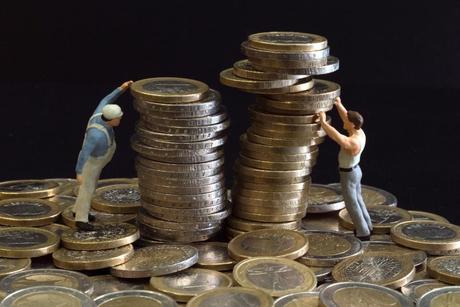Eurozone Economy Cools in Third Quarter

Growth in the 19-nation eurozone slowed to 0.3 percent in the third quarter, official data showed on Friday, with the economy in powerhouse Germany cooling as France returned to expansion.
The quarterly growth was below the analyst estimate of 0.4 percent for the period and will fuel speculation the European Central Bank will expand its vast stimulus program next month.
The Eurostat agency said the eurozone economy expanded more slowly than the 0.4 percent seen in the previous quarter and is in line to grow by 1.6 percent over the next 12 months.
"Bottom line: the Eurozone recovery is continuing, but it seems like driving with the handbrake on," said Peter Vanden Houte, analyst at Dutch lender ING.
"With the emerging countries still in the doldrums, little acceleration is to be expected in the coming quarters," he said, adding that the figures were too weak "to deter the ECB from going ahead" with more stimulus.
The slight slowdown was accentuated by a stalling Germany economy which also grew by a slower 0.3 percent, caught by falling demand from China and the Volkswagen pollution scandal.
Export-dependent Germany has seen weakened investment and a spike in uncertainty after a huge emissions scandal engulfed auto giant Volkswagen, Germany's landmark company.
- France rebounds -As questions arose over the health of the German economy, neighbouring France posted a return to growth in the third quarter with an expansion of 0.3 percent after having earlier stalled.
Finance Minister Michel Sapin said the latest figures meant France had "exited the period of extremely weak growth that had lasted too long".
Of the big eurozone countries, Spain grew the fastest with a 0.8 percent rate in the third quarter, though this was a slowdown from 1.0 percent in the previous three-month period.
Analysts agreed that the slowdown in emerging economies led by China undermined any benefit of a weaker euro that has fallen by about 20 percent in the past year against the dollar.
"Softer external demand appears to have muted any beneficial impact on exports from the lower euro," Jonathan Loynes, Chief European Economist at Capital Economics.
"We have long warned that growth could slow further ahead as the temporary boosts from lower oil prices and the weaker euro start to fade," he said.
Predictably, bailed-out Greece contracted sharply by 0.5 percent in the third quarter as the debt crisis and capital controls this summer threw the economy into disarray.
Although Greece had a record tourism year, gains were lost to the chaos stemming from the six months battle between the leftist government of Alexis Tsipras and international creditors.
More worryingly, the economy in recovery standout Portugal slowed unexpectedly to a standstill as domestic demand fell sharply.
Across the whole 28-nation EU, the economy expanded by 0.4 percent in the quarter, on course for 1.9 percent growth over 12 months.



